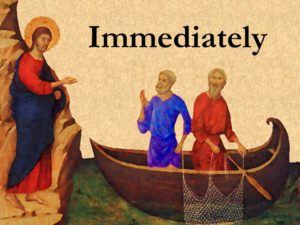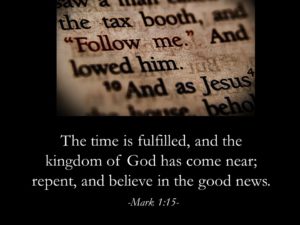There is an immediacy in Jesus’ invitation to follow – a right now tone – God is not far off, but has come near – things are going to change. Even though we are 2000 years removed from those fisherman on the shore of Lake Galilee, we too can respond to Jesus’ invitation “immediately” – right here, right now.
Jesus said to Simon and his brother Andrew, “Follow me and I will make you fish for people.” And immediately they left their nets and followed him. (Mark 1:17-18)
Immediately they left their nets and followed him.
Immediately.
They didn’t run home to change out of their work clothes. They didn’t leave a note for their family or their coworkers. They didn’t even pack up their gear or pull up the nets they had just cast. They just got up and followed Jesus.
Now, what do you think of that?
Out of all of the miraculous stories we hear in scripture, this may be the most far-fetched one of them all – especially to our post-modern, life is complicated ears. Short of dying or someone being hit by a truck, there isn’t much that we probably respond to that immediately, particularly when it comes to big, life decisions.
For example, we generally don’t immediately buy a house – or immediately get engaged – or immediately choose a career or find a job. All of those decisions take time and discernment and patience.
So, this whole “immediately” thing that Mark is talking about seems way beyond reality and yet here we are. What is the gospel writer communicating to us by writing about the call of the disciples in this way? What is going on here?
To answer this, we might imagine what it was like to live in Jesus’ day.
We know that by this point in history, the Roman Empire has taken over everything. The emperor’s hands are into every aspect of society. To make matters worse, Herod, the “King of the Jews,” is in league with the Empire – and besides that, Herod is a hateful man who was not afraid to have people killed at any time for any reason.
Of course, foreign influence and occupation was nothing new to people in this part of the world – and they did their best to adapt and survive from generation to generation – but you might imagine that people were also hungry for change – that they were ever watchful for something new – that in many ways, they were desperate for God to break-in and break-through in their lifetime.
And then along comes a rabbi who proclaims: “The time is fulfilled, and the kingdom of God has come near; repent, and believe in the good news” (Mark 1:15).
The rabbi does not proclaim the fulfillment of Rome’s kingdom – he speaks of God’s kingdom – it is God’s reign that has come near – heaven and earth are about to be joined together. Everything is about to change.
And there is immediacy in the Rabbi Jesus’ words – there is a right now tone to his message. Notice that Jesus does not say: “Keep doing what you’re doing, the kingdom of God is a ways off yet” or “the kingdom of God is what you will experience after you die.”
That’s not it – Jesus’ words are different – for him the “kingdom of God has come near” – right here, right now – in him. And this is a concept that can be really hard for us to wrap our minds around – the kingdom of God is not a place separate from this place. Instead, it is God’s reign–God’s presence and power and peace – indeed, it might be even closer to us than our very breath.
This is Jesus’ message as he walks along that lakeshore at the start of his ministry – You don’t have to wait until you die to experience a whole different kind of life. Now is the time. Not someday, not just when we die, but now. And for people desperate for change – for those longing for a glimpse of something better, the invitation to follow Jesus is not only life-changing, it is life-saving.
When Jesus encounters those four fishermen, he finds them, like us, working hard, earning a living, fulfilling their family obligations. And like some of us, perhaps he also finds them struggling to hold it all together, looking forward with worry, looking back with regret.
There are bills and taxes to be paid. For the sons of Zebedee, there is a father who relies on them. For Simon Peter, there is a mother-in-law with health concerns. And to my ears, this kind of sounds like life. Throw in worries about your kids and it is starting to sound really familiar.
Whatever the case, Jesus’ call to follow is a life-saving invitation – yes, it is a call to welcome God’s reign in our lives, but it is also less abstract than that – a call to discipleship is a call into community, into relationship – as Karoline Lewis writes:
Sometimes, I think we forget that being saved by Jesus, to follow Jesus, means that you have others around to save you on a daily basis. To remind you of who you are and who you are called to be. To see you and appreciate you and celebrate you. To tell you how far you have come and where God still needs you to go. To come alongside you so that you realize you are not alone.
So, who has saved you recently? Was it a friend – a coworker – a family member – a stranger? Who has encouraged you and reminded you that you matter, that you are worthy, that life is better with you in it? God at work in our midst – moving us, gathering us from the scatter of life to find strength and renewal and connection.
And if no-one has saved you recently – hear it now – you matter, you are worthy, you are loved, life is better with you in it.
The invitation to follow Jesus is not just about daily affirmation, but it is about knowing that we are valued and that we are valuable – to God and to each other.
When Jesus burst onto the scene, he came not only with an invitation but also with a message, with two specific instructions – repent and believe.
For some, repentance can conjure up images of sack cloth and ashes, of feeling bad about one’s life and of forced contemplation of the depth of our sin. This is not to say that contemplating our sin and offering confession don’t have their place, but there are other images for repentance too.
To repent, literally means to turn around. For example, when you’re alone and walking down a dark and scary road, turning around is not always a bad thing. It is a way to seek safety – to seek shelter.
Rick Morley writes that to: “Repent” is part of the poetry of exile, something that the Israelites knew a lot about. Repenting, when in exile, meant going home.
In essence, when Jesus instructs would be followers “to repent and believe” – Jesus is declaring the good news of God that we can go home, and that God will welcome us back with arms open wide. This is the message of good news that Jesus tells us to believe in.
For those fisherman and all who heard Jesus’ invitation to “follow him” in those first days, we might be able to imagine their “immediate” response – they were hungry for this news of God’s love – hungry to believe in the right now presence of God in their midst.
Our circumstances and our capacity to leave everything behind may be different, but we can still find ways to follow Jesus immediately – here and now.
We do this when we treat and speak of others with the same respect, love and patience that Jesus did, especially those who are on the margins of our society.
Indeed, we can respond to Jesus immediately this week at home, at work, at school – in all the places where we spend time – because we know that Jesus has come near – that we are part of a community – a movement in the world to make real this invitation to follow Jesus – to come home to God – to know God’s eternal embrace immediately – right here, right now.
Amen.
Rev. John Berg
Gloria Dei Lutheran Church, Northbrook, IL
Sources:
- “Time Fulfilled” – a reflection on Mark 1:14-20 – by Rick Morley – A Garden Path – January 11, 2012
- “No Time to Lose” – The Rev. Canon C. K. Robertson, Day1 Ministries, January 25, 2015
- “You Are Never Alone” – Karoline Lewis, Working Preacher, January 14, 2018
- “Following Jesus Today” – David Lose, In the Meantime…, January 19, 2015







